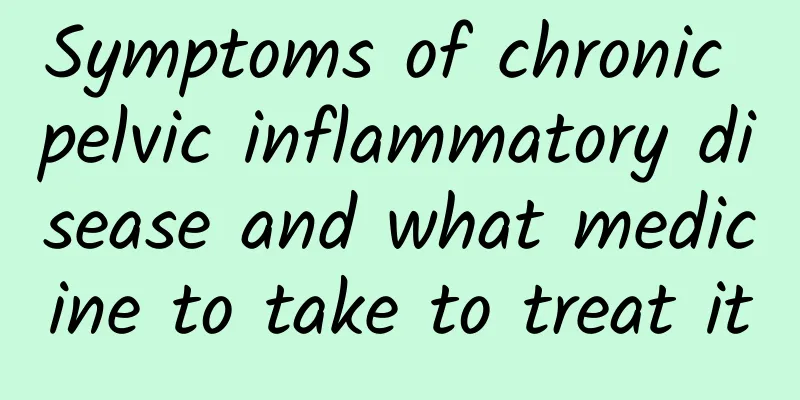Symptoms of chronic pelvic inflammatory disease and what medicine to take to treat it

|
What are the symptoms of chronic pelvic inflammatory disease and what medicines to take to treat it? When patients suffer from acute pelvic inflammatory disease, they do not receive thorough treatment, and their resistance is not strong. The disease will recur in the future, making it difficult to cure, and slowly turn into chronic pelvic inflammatory disease. The disease is relatively stubborn, but it can also lead to increased vaginal discharge, menstrual disorders, etc., which can have a serious impact on the reproductive health of patients, but also increase the economic burden on the family, so it must be treated strictly. What are the symptoms of chronic pelvic inflammatory disease? The main symptom of chronic pelvic inflammatory disease is chronic pelvic abdominal pain. This pain is manifested as pain in the lower abdomen, which will recur. Moreover, unlike acute pelvic inflammatory disease, the pain is milder and may be delayed. At the same time, it will recur, sometimes accompanied by lumbar pain, anal swelling and other phenomena. For women of childbearing age, if there is chronic pelvic inflammation, it is likely to cause hydrosalpinx and inflammation around the fallopian tubes, leading to tubal obstruction or blockage, and ultimately infertility. Some patients have some adhesions around the ovaries, which can also become inflamed. These adhesions can wrap around the ovaries, causing ovulation and also have a certain impact on pregnancy. What medicine should I take for chronic pelvic inflammatory disease? Chronic pelvic inflammatory disease will cause lower abdominal pain and will recur. It is usually treated mainly with medication. You can choose antibiotics, but it is better to have a basis in pathogen-related aspects and then take appropriate treatment plans to achieve more ideal results. You can first do a drug sensitivity test and secretion culture test, and then choose the appropriate antibiotics based on the results of these two tests. It may be difficult to get this result at first, and broad-spectrum antibiotics are usually selected. You can also choose Chinese medicine treatment, or use Chinese medicine treatment to improve. |
<<: Will a woman with a left ovarian cyst affect ovulation?
Recommend
Dark chocolate = high calories? "Smart way" to eat low calories and protect your heart
Protect your heart in summer and avoid cardiovasc...
Can endometrial thickening be cured without surgery?
Can endometrial thickening be cured without surge...
Two diet therapies for patients with functional uterine bleeding in autumn and winter
Patients with functional uterine bleeding who hav...
Experts explain physical therapy for mild cervical erosion
Physical therapy is currently a widely used metho...
Causes of ectopic pregnancy
Ectopic pregnancy means that under normal circums...
3 nutrients that are essential for those who eat out
"What do I want to eat for lunch?" &quo...
Diet can reduce the harm caused by menopause
Everyone needs to pay attention to the occurrence...
How to eat during intermittent fasting? Low-calorie tomato and tofu soup
The weight loss method of "fasting with 500 ...
Fasting and using fruits to lose weight will only make you fatter! Famous doctor Xiao Dunren: Develop 5 good habits to lose weight and avoid gaining weight again
There are hundreds of ways to lose weight, and ma...
During the recovery period of cervical erosion, we must pay attention to the details of life
Cervical erosion is a common gynecological diseas...
How long does it take to cure chronic pelvic peritonitis?
What is the treatment for pelvic peritonitis? Thi...
Is it good to have an abortion at two months of pregnancy?
It is best to choose an appropriate method of ter...
How does vulvar itching affect conception?
Does vulvar itching have any impact on female pre...
Which one is less harmful to the body, medical abortion or surgical abortion
Both medical abortion and surgical abortion are m...
What are the causes of cervical hypertrophy?
What are the causes of cervical hypertrophy? Cerv...









